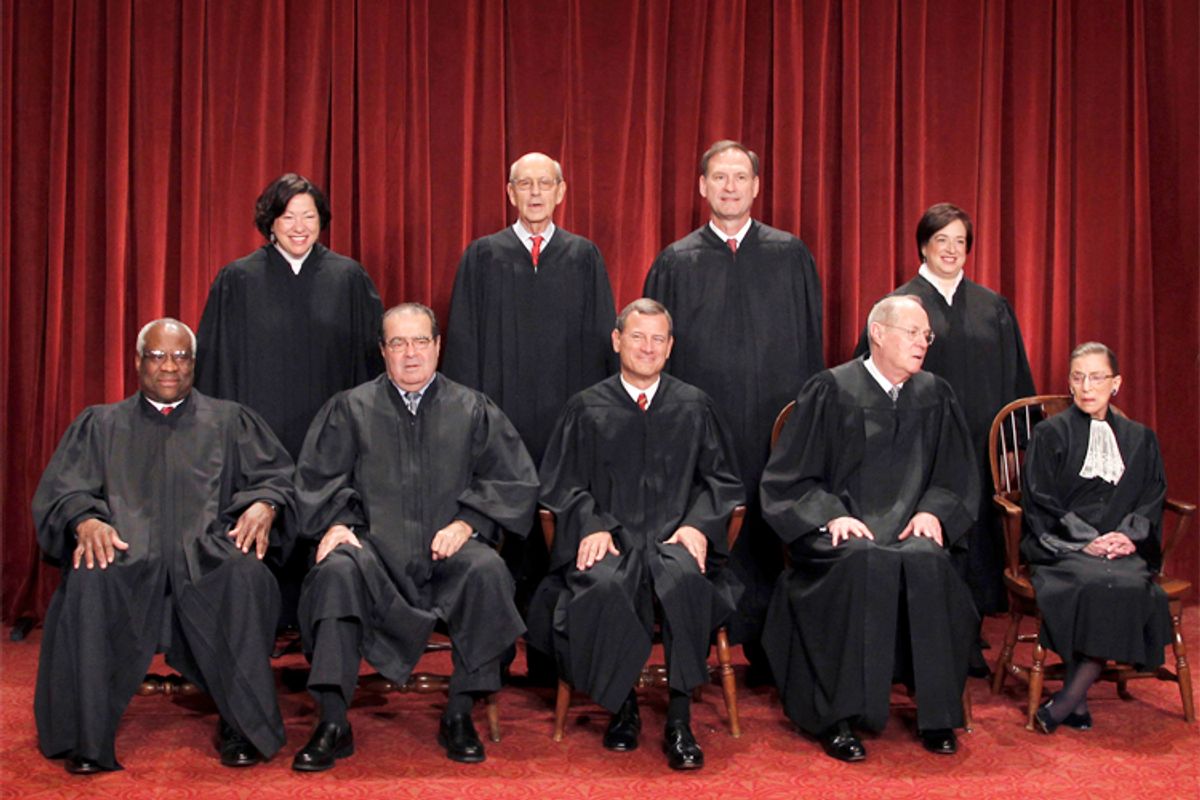Does money in politics foster corruption?
To most observers, the answer is a plain "of course." But under Chief Justice John Roberts, the U.S. Supreme Court has answered in the negative, making sweeping statements about the innocuousness of a political system drenched in contributions from corporations and wealthy individuals.
Writing the majority opinion in the 2010 Citizens United case, in which the high court struck down restrictions on independent political expenditures by corporations and unions, Justice Anthony Kennedy asserted, "independent expenditures including those made by corporations, do not give rise to corruption or the appearance of corruption."
"That speakers may have influence over or access to elected officials does not mean that those officials are corrupt. And the appearance of influence or access will not cause the electorate to lose faith in this democracy," Kennedy added.
The court further weakened campaign finance laws this spring, when it ruled 5-4 in McCutcheon v. Federal Election Commission that aggregate contribution limits are unconstitutional. As University of California-Irvine law professor and campaign finance expert Richard L. Hasen argued in response to the ruling, McCutcheon marked yet another sign of the"virtual disappearance of the 'appearance of corruption' as a basis for limiting campaign contributions."
"Spending large sums of money in connection with elections, but not in connection with an effort to control the exercise of an officeholder's official duties, does not give rise to such quid pro quo corruption," Roberts wrote in the case. "Nor does the possibility that an individual who spends large sums may garner 'influence over or access to' elected officials or political parties."
Citizens United and McCutcheon both pertained to federal campaign finance regulations, but it was hard not to recall Kennedy and Roberts' naiveté when reading the New York Times' extensive report Wednesday on the seemingly unbridled influence corporate lawyers and lobbyists wield over state attorneys general.
The Times' Eric Lipton takes us back to a fundraiser for the Democratic Attorneys General Association at the swanky Loews Santa Monica Beach Hotel in California, where lawyer Lori Kalani of the corporate firm Dickstein Shapiro cornered Missouri Attorney General Chris Koster, over his state's participation in a nationwide investigation into claims that the makers of 5-Hour Energy, a Dickstein Shapiro client, engaged in misleading advertising.
“My client just received notification that Missouri is on this,” Kalani told Koster.
Dickstein Shapiro, Lipton notes, "had courted the attorney general at dinners and conferences and with thousands of dollars in campaign contributions." And it wasn't long after Kalani confronted him that Koster instructed his office to abandon the investigation into 5-Hour Energy. Lipton also reported that Koster rushed through a consumer fraud settlement with the pharmaceutical firm Pfizer, also a Dickstein Shapiro client, after accepting an invitation to speak at a breakfast for Pfizer's political action committee. Like Dickstein Shapiro, Pfizer had also lavished funds on Koster's campaigns, donating more than $20,000 to the Democrat over the course of his political career.
By the way -- the topic of Koster's speech? "[T]he importance of corporations’ building productive relationships with A.G.s."
Koster is far from the only attorney general to go soft on corporations represented by campaign contributors. But his case is particularly instructive, and it exposes the pitfalls of the Supreme Court's lax attitude about money in politics. While Roberts posits that corruption does not arise unless actual bribery takes place, Koster's dealings illustrate that there's no need for an explicit tit-for-tat in order for elected officials to pursue policies that serve their political benefactors. Kalani did not promise a campaign contribution to Koster if he dropped the 5-Hour Energy inquiry, but does any serious person doubt that Dickstein Shapiro's financial generosity was on his mind when he weighed whether to proceed? And does any sentient observer really believe that this sort of scenario doesn't play out constantly in Congress and statehouses across the country?
The research demonstrates that politicians prioritize the interests of America's most affluent citizens, who also just so happen to be America's biggest and most reliable campaign donors. The Supreme Court may pretend otherwise, but even in the absence of outright bribery, the nation's elected officials can indeed be "bought and sold," to borrow a phrase from then-Justice John Paul Stevens' dissent in the Citizens United case. And that poses a perilous risk to democracy.

Shares